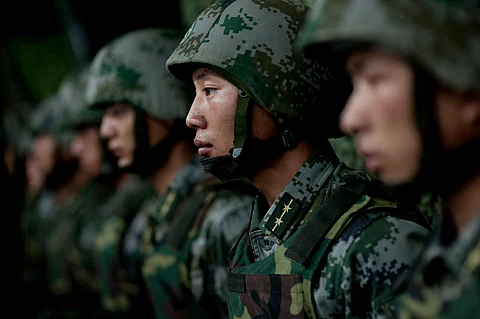

China's Defense Ministry on Sunday defended its 7.2% increase in military spending, citing "significant challenges" and the need to modernize its armed forces amid growing geopolitical rivalries, particularly with the United States. The announcement came during the annual session of the National People's Congress (NPC), China's largest political gathering, known as the "Two Sessions."
Defense Ministry spokesman Wu Qian described the budget hike as "reasonable and steady," emphasizing that it aligns with the country's economic growth. The budget will rise to 1.81 trillion yuan ($250 billion) this year. Wu's remarks underscore Beijing's commitment to advancing its military capabilities as it aims to transform the People's Liberation Army (PLA) into a "world-class" force by 2027, the centenary of its founding.
Taiwan Tensions Highlighted
Wu also addressed escalating tensions with Taiwan, warning that the PLA would tighten its "noose" around the self-ruled island if separatist activities intensify. "The more rampant 'Taiwan independence' separatists become, the tighter the noose around their necks and the sharper the sword hanging over their heads will be," Wu said, according to state-run Xinhua News Agency. He described the PLA as a "force of action" in countering separatism and promoting reunification.
In a stark warning to Taiwan's leadership, Wu added, "You've ridden your steed to a precipice of a cliff, but behind you lies land – if you persist in taking the wrong course, you will meet a dead end."
The comments reflect Beijing's growing assertiveness over Taiwan, which it views as a breakaway province. The PLA has conducted numerous military drills near the island in recent years, raising concerns about a potential conflict.
Modernization Goals and Challenges
Wu acknowledged that achieving the PLA's modernization targets by 2027 would be a significant challenge. The military's transformation includes developing advanced technologies, enhancing combat readiness, and expanding its global presence. The budget increase is seen as a critical step in achieving these goals, particularly as China faces heightened competition with the U.S. in areas such as cybersecurity, space, and maritime security.
The announcement comes amid ongoing tensions between Beijing and Washington over issues ranging from trade and technology to regional security. Analysts suggest that China's military expansion is partly aimed at countering U.S. influence in the Indo-Pacific region.
As China continues to bolster its defense capabilities, the international community will closely monitor how these developments impact global stability and regional dynamics.